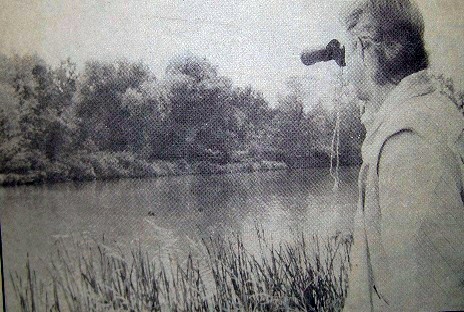THE ALL BUT FORGOTTEN HISTORY OF BROWN BRIDGE
Pilings still visible in Welland River, as Historian seeks complete story
17 March 1943-25 July 2016
[Guardian Express]
A lot of water has passed over the bridge since Tony Whelan was a kid. Yes-over the bridge. The Brown Bridge.
 Growing up on River Road, Whelan remembers being told to stay clear of the old bridge pilings in the Welland River near Colbeck Drive, whenever he set out in his row boat.
Growing up on River Road, Whelan remembers being told to stay clear of the old bridge pilings in the Welland River near Colbeck Drive, whenever he set out in his row boat.
He stayed clear, but remained intrigued.
Whelan believes the bridge is an important part of local history that has been overlooked. And with the only people who may remember it growing older all the time. Whelan said he he’s afraid the Brown Bridge chapter of the city’s history will be lost forever.
As a historian, Whelan isn’t happy about progress’s tendency to sever its ties with the past.
Although by trade he’s a professional entertainer, a deep interest in genealogy and history consumes most of the rest of his time. Whelan lives in the same house-even sleeps in the same bedroom-he was born in. While he’s reluctant to disclose just how many years ago that was, the fact the youthful-looking Whelan has two young grandchildren gives a clue to his approximate age.
“When you do find something,” Whelan says of historical research, “oh, the feeling, the rewards. You think you just won the lotter.
CHAIRMAN
Now second chairman of the Niagara branch of the genealogical Society of Ontario, Whelan says he became interested in family and local history “because it was there.”
“It was just something of interest. And as it gets under y our skin, that’s it-you’ve had it” he says, a bright white smile breaking on his tanned face.
A self-confessed admirer of the off-centre facts in life, Whelan says he’s looking for the “horse thief” in his family tree. So far, Benedict Arnold is the only high profile black-mark in Whelan’s mother’s lineage.
Whelan, himself, ran away with the circus as a young teenager. He says he can’t help wondering what future generations of Whelans will think of him.
In one corner of Whelan’s dining room, Reuben, a yellow cockatiel, oversees the interview perched atop the outside of his cage. Behind an antique dining set, a bay window opens the room to a view of a lush rear yard. At the yard’s foot flows the Welland River.
The mysterious Brown Bridge pilings poke out of the water about a mile-and-a-half downstream.
Whelan believes the bridge was built by John brown, who died in 1797. Recently Whelan was told by an elderly area resident that the bridge collapsed under the weight of ice, in 1926.
The 83-year old gentleman who told Whelan that also gave him a detailed description of what the bridge looked like, and Whelan was able to make a sketch of it.
So far, though, the ice collapse has gone uncorroborated. *There are many blank areas in the 1926 newspaper that might have corroborated this.
Whelan says that during the War of 1812, Misener’s Bridge, which ran parallel to Brown’s Bridge further east on the river was burned. After breaking away from the control of the American army in 1813, the Canadians (then United Empire Loyalists) apparently torched the bridge to protect themselves from anther invasion.
Whelan believes that William Lyon MacKenzie, in his 1837 escape to the United States, crossed the Welland River over Brown’s Bridge. A newspaper publisher, expelled member of the Ontario legislature, and open advocate of an independent Canadian government. MacKenzie later returned to Canada on an amnesty grant for rebels.
COMMUNITY
In researching the area near the Brown’s Bridge, Whelan discovered it was a bustling, self-contained community at one time. Welland’s first library was there, doubling as a public meeting house. The library wasn’t moved to downtown Welland until 1858. There was a schoolhouse near the bridge site, on the Thorold side of Townline Road.
“This bridge has a lot of historical value,” says Whelan wrinkling his brow. “If we don’t get the information on it now…”
“I’m searching out anybody who definitely know about the area and particularly about its bridge,” he says. “I need help from this area’s senior citizens.”
Whelan maintains he will make sure any information he gets will be properly recorded, so this will be available to future generations.
“If you don’t know where you’ve been, how do you know where you’re going?” he asks.
 Subscribe..
Subscribe..
Add A Comment
You must be logged in to post a comment.